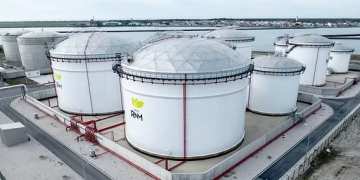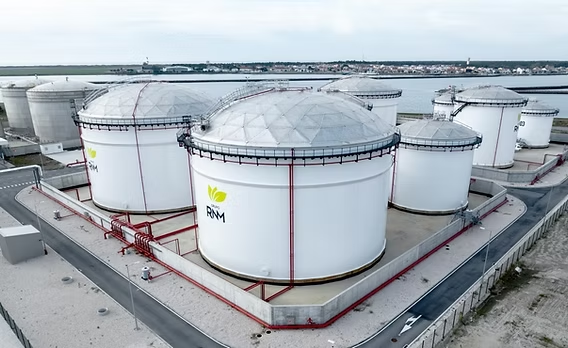By Eva Richardson | The Logistic News
April 9, 2025
In a landmark initiative underscoring Europe’s green energy transition, BP Portugal and RNM Group have jointly inaugurated an advanced biofuels logistics terminal at the Port of Aveiro. The newly operational site is poised to become a major hub for the storage, blending, and distribution of next-generation fuels, reinforcing Portugal’s role in the renewable energy logistics ecosystem.
57,000 Cubic Meters of Sustainable Storage Capacity
The state-of-the-art terminal adds 57,000 cubic meters of storage space to RNM’s infrastructure and is specifically designed to handle advanced biofuels. Built with a modular and future-proof approach, the terminal will serve as a flexible logistics platform capable of adapting to evolving fuel technologies and sustainability goals.
As part of the strategic partnership, BP will utilize the facility under a long-term service agreement, enhancing its capability to deliver competitive and reliable low-carbon fuels throughout the region.
A Strategic Move Toward Carbon Reduction
“This is more than a logistics expansion—it’s a turning point for energy supply chains in Portugal,” said Ricardo Machado, Chairman of RNM Group’s Board. “By opening this terminal, we’re not just responding to fuel logistics needs. We’re leading a transformation toward cleaner, more efficient, and more sustainable distribution.”
Located along Portugal’s Atlantic coast, the Port of Aveiro offers strategic maritime access to both domestic and international shipping routes, positioning the new terminal as a pivotal node in Europe’s low-emissions fuel supply network.
Logistics Meets Climate Commitments
The development is aligned with both European Union and Portuguese national goals for emissions reduction and renewable energy deployment. As part of the EU’s Fit for 55 package and REPowerEU plan, demand for advanced fuels—including renewable diesel, bioethanol, and SAF—is expected to surge.
Logistics infrastructure is the missing piece in that equation, and this terminal directly addresses the challenge.
“Fuel innovation is meaningless without reliable infrastructure to scale it,” said one BP logistics executive. “This terminal is exactly the kind of strategic asset we need to close the gap between production and consumption.”
A Future-Proof Logistics Asset
Designed with adaptability in mind, the terminal includes features for digital integration, intermodal connectivity, and phased expansion. Whether handling biofuel blends, synthetic fuels, or even hydrogen derivatives in the future, the facility is ready to scale with market demand.
The project also places a strong emphasis on operational safety, regulatory compliance, and environmental stewardship—ensuring that sustainability is embedded at every level.
Conclusion: Portugal at the Crossroads of Green Fuel Distribution
BP and RNM’s new logistics terminal in Aveiro is more than an investment in infrastructure—it is a strategic bet on the future of global energy logistics. As the world races to decarbonize its transport and energy sectors, hubs like this will be critical to translating policy into practice.
For exclusive analysis on sustainable logistics infrastructure, renewable fuels, and global supply chain strategy, follow Eva Richardson and The Logistic News on LinkedIn and Google News.





















